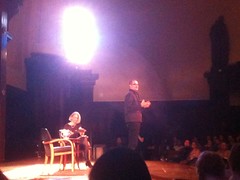There was a time when the terms “unbiblical” or “unorthodox” were trump card answers for me. Now I see them not only has unhelpful, but as very detrimental to needed conversation concerning the future of the church.
I remember asking in undergrad, “What’s wrong with Arminian Theology?” and was given the response, “Well a thorough examination of Scripture will prove that it’s simply unbiblical“. That worked great for me until I met an Arminian who told me the problem with Calvinism was that it was “unbiblical”. Then to complicate matters, I started investigating and some days I find both views to be “biblical” and other days, both to be “unbiblical” and a couple days a bit of both. To me those terms are the near equivalent to a parent’s trump card line, “Because I said so.”
This is among the issues that bothers me with some of my fellow evangelicals that we ought to honestly discuss. What is better to say is that a particular position is contrary to our interpretation of Scripture. Like everyone, I too quite often find things that run against my personal hermeneutics. I think sometimes I’m right and sometimes I don’t know I’m wrong. And while my seminary experience was quite helpful in confirming certain suspicions, it also revealed quite a few blindspots in my understanding of Scripture. I try to operate with a lot more humility and generosity these days.
This is what bothers me about the John Pipers, John McArthurs, Al Mohlers and the younger Neo-reformed crowd (like Kevin DeYoung, Justin Taylor and the Gospel Correction crowd). Now, before I start too far down this road, know that our essential convictions are probably similar. Know that I believe that these men love the Lord and mean well and please extend that benefit of the doubt to me. But a collective gift many of us conservatives have is slamming the door shut on anything that strikes us as “unbiblical.”
I encourage you to test this theory – whenever a group of conservatives and a group of liberals (and I know there are numerous shades in between but let’s keep it simple) and as soon as the conservatives identify the liberals, they leave the conversation, thereby leaving the table “liberal.” As a church we would do well to keep the conversation going, to share, discuss, as opposed to debate, argue, and exit. Exhibit A for me is the emerging church conversation. This conversation offers so much and it would be well-served if conservatives came back to the table.
Why does this matter so much to me? Reason 1, vocationally, I’m a youth pastor – I have to be open for conversation because teenagers walk in my youth room with some terrible theology. Some of it is due to a generational perspective, some of it is due to their parents, some of it is simply the fact they’re young and they are very much in the process of forming their views on God, the world and discovering who they are. Reason 2 is that I am an evangelical and I have a heart for non-believers. They sit at my table with very different views. To dismiss their convictions and opinions only reinforces the stereotype that evangelicals are arrogant, anti-intellectual and suffer from a superiority complex. Reason 3 is the example of Jesus. A careful reading of the Gospels shows that he debated those who presumed to have it all figured out and engaged in loving conversations with those that were very different from him (to put it mildly).
Which leads us to today’s big conversation – Rob Bell and his ideas in his book Love Wins (you can check out my review here). Should Rob Bell really be considered “unorthodox”? Can he be dismissed as “unbiblical?” Was it fair for Martin Basher to berate him with the line, “You are trying to make the gospel palatable, aren’t you?” Is it not better to say, “That’s interesting but I don’t see that way – let’s talk about it?”
In a time when evangelism is splitting and on the decline and further the growing divide between Christian believers and non-Christians believers, it would serve us well to sit at as many tables as we can, to share our viewpoints generously and lovingly and to grow in conversation.
While John Piper’s famous “Farewell Rob Bell” tweet helped Harper Collins sell more books, it would have been far better for the Kingdom had he tweeted, “I look forward to reading your new book Rob. Let me know when you come to Minneapolis, would love to grab lunch.”
That seems like a really naive statement now, but I tell you, it’s very Biblical, very Orthodox and very Jesus-like.
So back to my original question, are these terms still helpful for us today? Yes, when used humbly and responsibly. Thoughts?
 Talking about Love Wins is a bit like ruining a movie. There’s huge rush to answer and judge certain questions, “Is Rob a universalist? No?? Well, he’s still a heretic”, “Does he believe hell is real, here, there, forever, empty, full?” “What? Well, he’s still ambiguous” … So I’m going to do my best not to ruin too much for you because you really should read it for yourself. But he asks great questions, offers excellent insights but my favorite part of the book is that his heart comes through, and I would suggest, interestingly, it comes through stronger than any Nooma video, sermon, or HD production he’s ever given.
Talking about Love Wins is a bit like ruining a movie. There’s huge rush to answer and judge certain questions, “Is Rob a universalist? No?? Well, he’s still a heretic”, “Does he believe hell is real, here, there, forever, empty, full?” “What? Well, he’s still ambiguous” … So I’m going to do my best not to ruin too much for you because you really should read it for yourself. But he asks great questions, offers excellent insights but my favorite part of the book is that his heart comes through, and I would suggest, interestingly, it comes through stronger than any Nooma video, sermon, or HD production he’s ever given. David Fitch’s post
David Fitch’s post  Let me describe the vibe of the room – it was buzzing and once again it reminded me of that line “Rob Bell is a rock star in the evangelical world”. Don’t take it out on Bell, it was similar to that when we went see NT Wright at Wheaton too and that crowd was a bit older, established, educated even, etc. Indeed the room was filled with many appreciators of Rob. I wondered beforehand how many critics were there given the firestorm but even during the Q&A, I didn’t get the sense that many had come. I thought all the questions were honest (though they may not have been great) but certainly appropriate for what everyday people are thinking like, “Will God force an atheist into heaven?” And for those wondering, the questions were selected randomly.
Let me describe the vibe of the room – it was buzzing and once again it reminded me of that line “Rob Bell is a rock star in the evangelical world”. Don’t take it out on Bell, it was similar to that when we went see NT Wright at Wheaton too and that crowd was a bit older, established, educated even, etc. Indeed the room was filled with many appreciators of Rob. I wondered beforehand how many critics were there given the firestorm but even during the Q&A, I didn’t get the sense that many had come. I thought all the questions were honest (though they may not have been great) but certainly appropriate for what everyday people are thinking like, “Will God force an atheist into heaven?” And for those wondering, the questions were selected randomly. Soon after he was asked another direct question (around the 28 minute mark) that was something to the effect of “Coming from a Jewish family, we would find it offensive for you to imply that our salvation has to come from Jesus.” I seriously wonder if anyone in evangelicalism could have had a better a Christian answer and not come across as offensive to her. It was probably my favorite moment of the night. He refereed to Moses striking the rock and providing water for the Israelites (Numbers 20) and said later, Paul describes the water from this rock as Christ (I Cor. 10). Paul does not offer much commentary there but the implication is that God has always been rescuing people. He mentions that it’s good for us to be generous when talking about such things, Jesus comes and makes the Torah speak, shows compassion, love, etc. concluding that Jesus is a paradox that we have been wrestling with for thousands of years. She seemed sincerely satisfied with that answer and frankly, I am not sure many other evangelicals could have done better in the sense of serving the asker and honoring the Lord. Some may dismiss that as tightrope walking, others may see it as a powerful and truthful moment.
Soon after he was asked another direct question (around the 28 minute mark) that was something to the effect of “Coming from a Jewish family, we would find it offensive for you to imply that our salvation has to come from Jesus.” I seriously wonder if anyone in evangelicalism could have had a better a Christian answer and not come across as offensive to her. It was probably my favorite moment of the night. He refereed to Moses striking the rock and providing water for the Israelites (Numbers 20) and said later, Paul describes the water from this rock as Christ (I Cor. 10). Paul does not offer much commentary there but the implication is that God has always been rescuing people. He mentions that it’s good for us to be generous when talking about such things, Jesus comes and makes the Torah speak, shows compassion, love, etc. concluding that Jesus is a paradox that we have been wrestling with for thousands of years. She seemed sincerely satisfied with that answer and frankly, I am not sure many other evangelicals could have done better in the sense of serving the asker and honoring the Lord. Some may dismiss that as tightrope walking, others may see it as a powerful and truthful moment.





Recent Comments